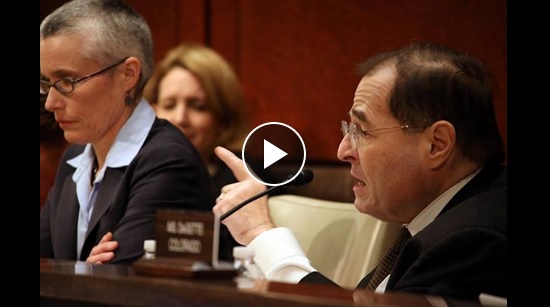E-Newsletter
E-newsletter: Leading the Defense of Reproductive Rights
Washington, DC,
March 16, 2016
Leading the Defense of Reproductive Rights Video of Rep. Nadler's (NY-10) statement during Select Panel hearings At the first hearing of the Select Panel investigating Planned Parenthood and fetal tissue research, I joined with the other Democratic Members to defend the rights of women to make their own reproductive health choices. Fetal tissue research has bipartisan support and is vital for finding potentially lifesaving treatments. In fact, it was President Ronald Reagan who convened a panel which established strict guidelines for fetal tissue research, and there has been zero evidence shown that anyone has violated these guidelines. This absurd witch hunt could be putting lives at risk as a result of the Panel's subpoena of the names of doctors, patients, and researchers. Watch my statement here. Providing New Protections for Living Organ Donors Every year, thousands of Americans donate kidneys, livers, and other organs to save the lives of family members, friends, and even complete strangers. An organ donor’s decision to undergo these invasive procedures not only saves lives, it saves money. Organ donation cuts health care costs by as much as two-thirds, saving Medicare millions of dollars every year. Yet, despite taking this heroic step to save a life, living organ donors many times face discrimination when they try to take medical leave or buy insurance. For example, The Family and Medical Leave Act (FMLA) does not specify that living organ donors can take unpaid leave to recover and does not guarantee that donors will have a job waiting for them after surgery. Further, according to a 2007 study in the American Journal of Transplantation, many living organ donors experience difficulty securing or paying for insurance after their procedures because of discriminatory practices. In support of such cost-effective and life-saving procedures, Congress should protect the rights of living donors to receive the insurance and medical leave they need. To do this, I have introduced the Living Donor Protection Act, which would prohibit life, disability, and long-term care insurance companies from denying/limiting coverage, or from charging higher premiums to living organ donors. Additionally, it clarifies the existing FMLA so that living organ donors may use the leave to recover from the surgeries and procedures involved in their donation. Small changes to the law can make a large difference in so many lives, which is why I hope we are successful in getting this legislation passed. Ensuring Resolution for Jewish Refugees from Arab Countries and Iran In 2008, I authored a bipartisan bill which unanimously passed the House recognizing the importance of the issue of Jewish and other refugees from Arab countries. Last week, I introduced a new bill along with Representatives Ileana Ros-Lehtinen of Florida, Eliot L. Engel of New York, and Ted Poe of Texas, requiring the President to report to Congress on federal actions to ensure that any future Arab-Israeli peace accord will also fairly address the issue of Jewish and other refugees displaced from Arab countries and Iran. Protecting NYC from the Damaging Effects of Climate Change
As we all know, Lower Manhattan was badly damaged during Superstorm Sandy, and continues to be vulnerable to coastal flooding and rising sea levels. I am pleased to announce that New York City was chosen for a grant award of $176 million by the U.S. Department of Housing and Urban Development (HUD) in order to protect Lower Manhattan from ongoing—and likely increasing—risks of climate change. I was a strong supporter of the City's application to HUD and continue to push for all of the neighborhoods affected by Sandy to be able to access the resources they need to protect themselves against future disasters. Lower Manhattan is one of the fastest growing residential neighborhoods in New York, as well as one of the country’s largest central business districts, and home to major regional transportation and infrastructure resources. As the area continues to face risks from coastal flooding and climate change, we must provide significant flood protection and increase long-term resiliency for the entire area. This federal funding is a start and we must make certain that no neighborhoods are left behind. Sincerely,
|


